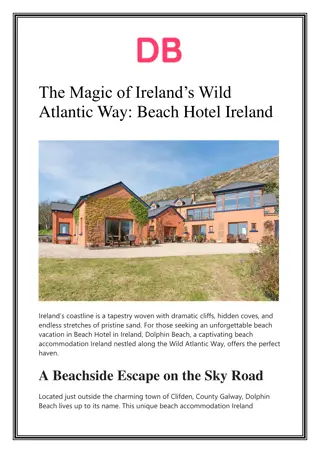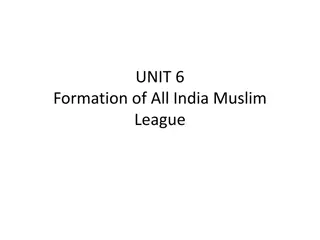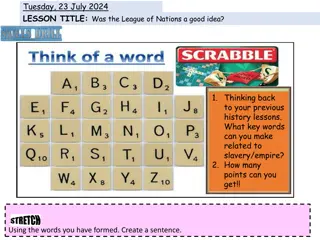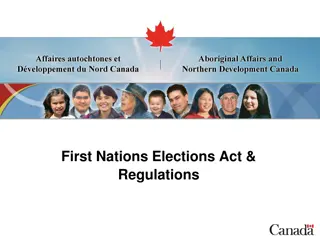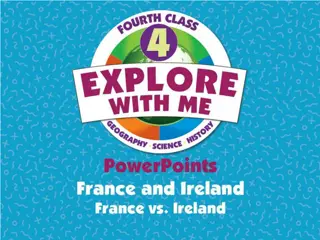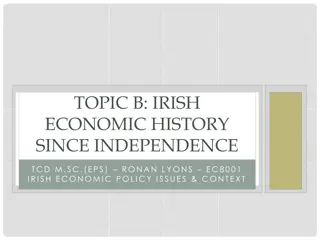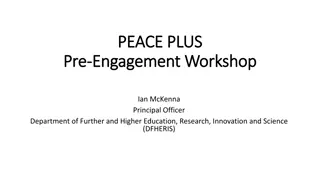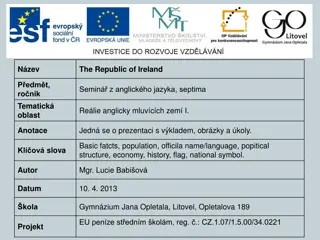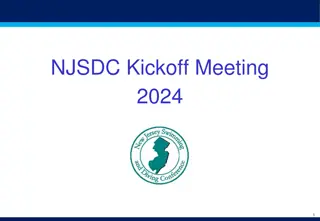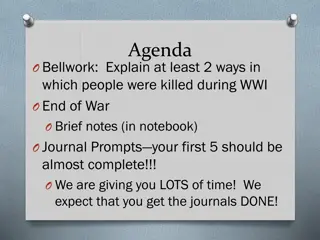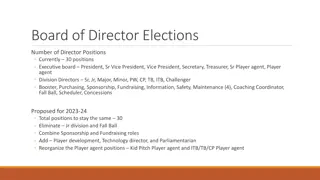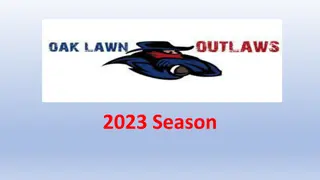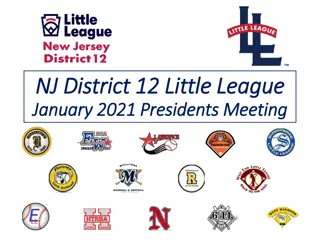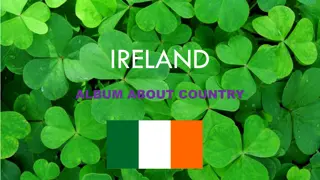Ireland's Engagement with the League of Nations: Path to Independence
Ireland's entry into the League of Nations in 1923 marked a significant step towards independence after the War of Independence and Civil War. Through joining the League and asserting its independence, Ireland demonstrated its readiness to participate in global initiatives for peace and cooperation. This decision was reinforced by the Anglo-Irish Treaty and the country's commitment to international treaties. The debate in Dail Eireann highlighted Ireland's willingness to engage with the international community while upholding its sovereignty.
Download Presentation

Please find below an Image/Link to download the presentation.
The content on the website is provided AS IS for your information and personal use only. It may not be sold, licensed, or shared on other websites without obtaining consent from the author.If you encounter any issues during the download, it is possible that the publisher has removed the file from their server.
You are allowed to download the files provided on this website for personal or commercial use, subject to the condition that they are used lawfully. All files are the property of their respective owners.
The content on the website is provided AS IS for your information and personal use only. It may not be sold, licensed, or shared on other websites without obtaining consent from the author.
E N D
Presentation Transcript
Ireland & Ireland & the league the league of Nations of Nations
How did Ireland engage with the League of Nations? Today s Today s Lesson Lesson How did this tie in with movements towards Irish independence? How has Ireland engaged on the world stage since the League of Nations?
Joining the League Joining the League Ireland, then known as the Irish Free State, joined the League of Nations in September 1923 (Pictured) It was an early statement of Ireland s independence as it was just emerging from the War of Independence & subsequent Civil War
Joining the League Joining the League Seeking to show Ireland s independence, their travel documents were in Irish, they used the Irish forms of their names and communicated in French, Irish and only finally in English Irish Times Ireland now joined the other nations on the world stage Addressing the assembly, Cosgrave began in Irish, and moved to English, concluding that Ireland resolved to play her part in making this great institution for peace as complete and efficient as possible. Irish Times
The Anglo The Anglo- -Irish Treaty Irish Treaty Cosgrave wanted to affirm Ireland s independence through membership of the League of Nations Ireland became a member of the League in September 1923, as a dominion of the British Commonwealth Cosgrave had the Treaty registered as an international treaty between two states, against the protests of the British government which argued that it was in internal British treaty
Dail Debate, Friday 19 Dail Debate, Friday 19th thApril 1919 April 1919 Mr. DE VALERA, speaking in Irish, said it was fitting that the D il should make a solemn pronouncement on the League of Nations, thus demonstrating that Ireland was not selfish or self-absorbed, recognising no obligation to anyone else. They were eager to take part in every great world-undertaking that the peoples of the world should impose upon themselves for the good of all, and to undertake the full duties of a free nation. They were ready to enter any League of Nations in which each nation would be under the obligation not to resort to arms against another nation in the League without first submitting the matter at issue to a Court of Arbitration. But they were not prepared to enter the League as it was appearing at present. Oireachtas.ie
Dail Debate, Friday 19 Dail Debate, Friday 19th thApril 1919 April 1919 Mr. M. COLLINS stated that the motion the Ministry wished to have adopted was: "The elected Parliament and Government of the Irish Republic pledged the active support of the Irish Nation in translating into deeds the principles enunciated by the President of the U.S. at Washington's tomb on July 4th, 1918, and whole-heartedly accepted by the people of America during the war. We are eager and ready to enter a World League of Nations based on equality of rights, in which the guarantees exchanged neither recognise nor imply a difference between big nations and small, between those that are powerful and those that are weak. We are willing to accept all the duties, responsibilities, and burdens which inclusion in such a League implies. Oireachtas.ie
Ireland in the League Ireland in the League of Nations of Nations Heads of state such as W.T. Cosgrave & Eamon de Valera used the League of Nations as a staging ground to cultivate stronger relations & ties with other countries around the world, both big & small As an equal nation in the League Ireland played a key role in several international events Ireland was elected to the Council of the League for a three year term in 1930
Joining the League Joining the League On behalf of Ireland, one of the oldest and yet one of the youngest nations, and speaking for the Irish government and the Irish delegation, I thank this assembly of the League of Nations for the unanimous courtesy and readiness with which our application to be admitted to membership of the League has been received and approved. W.T. Cosgrave on Ireland joining the League of Nations, 10thSeptember, 1923
Joining the League Joining the League We shall return to our own country to take part with our own patriotic people in the enormous work of national construction and consolidation. The kind welcome, the cordial words of understanding, that have greeted us here on the part of every nation whose representatives we have met, will not be forgotten. They will cheer and sustain us in that work, and they will remind us, too, that as the life of a man is bettered and fructified beyond measure in the harmonious society of men, so must the life of nations reach a much fuller liberty and a much fuller dignity in the harmonious society of nations. W.T. Cosgrave on Ireland joining the League of Nations, 10thSeptember, 1923
Irelands First Ireland s First Diplomat Diplomat Michael MacWhite (1883-1958), a former teacher, French Foreign Legionnaire and journalist born in Glandore, Co Cork, was one of Ireland s first diplomats. He was Ireland s first permanent delegate to the League of Nations (1923-9).
Sean Lester Sean Lester Sean Lester was an Irish diplomat & by 1929 hew was Ireland s representative to the League of Nations He ultimately became the Secretary General of the League of Nations, although he would turn out to be it s last as it was dissolved after World War II to make room for the United Nations
And so that first step of joining the League of Nations in 1923 and the decision to take a principled, independent approach in multilateral affairs continues to find expression in Irish foreign policy today. As our team walks the same halls of the Palais des Nations in Geneva, those same objectives and values inform our everyday work- a commitment to multilateralism, peaceful settlement of disputes, disarmament, human rights and the rule of law. Department of Foreign Affairs Website
De Valera as Chair of De Valera as Chair of the League of Nations the League of Nations In 1932 Ireland was chair of the League of Nations and de Valera used this platform to further Irish independence He called out the League for failing to protect the rights of smaller nations; People are saying that the equality of States does not apply here in the things that matter, that the smaller States whilst being given a voice have little influence in the final determination of League action De Valera used the League to establish friendly relations with other nations, which Ireland would need during the Economic War, and to boost his profile at home as a world statesman He cultivated relations with small nations which would garnish support for the dismantling of the Treaty in the future
However it may be disguised, it can only be with a feeling of bitter humiliation that each successive speaker has during these days come to this Tribune. Abyssinian Abyssinian Crisis, 1936 Crisis, 1936 Over fifty nations pledged themselves to one another in the most solemn manner each to respect the independence and to preserve the integrity of the territories of the others. One of these nations turned its back on its pledges freely given, and was adjudged almost unanimously by the remainder to have been an aggressor, and now, one by one, we have come here to confess that we can do nothing effective about it. Over fifty nations we banded ourselves together for collective security. Over fifty nations we have now to confess publicly that we must abandon the victim to his fate. It is a sad confession, as well as a bitter one. It is the fulfilment of the worst predictions of all who decried the League and said it could not succeed. As has been said already, we are all of us in some measure responsible for this pitiable position, some much more responsible than others. Read the speech delivered here by the Emperor of Ethiopia. Does any delegate deny that, so far as it relates to what has happened here, there is to his knowledge truth in every line of it?. Eamon de Valera to the League of Nations
How did Ireland engage with the League of Nations? Today s Today s Lesson Lesson How did this tie in with movements towards Irish independence? How has Ireland engaged on the world stage since the League of Nations?





